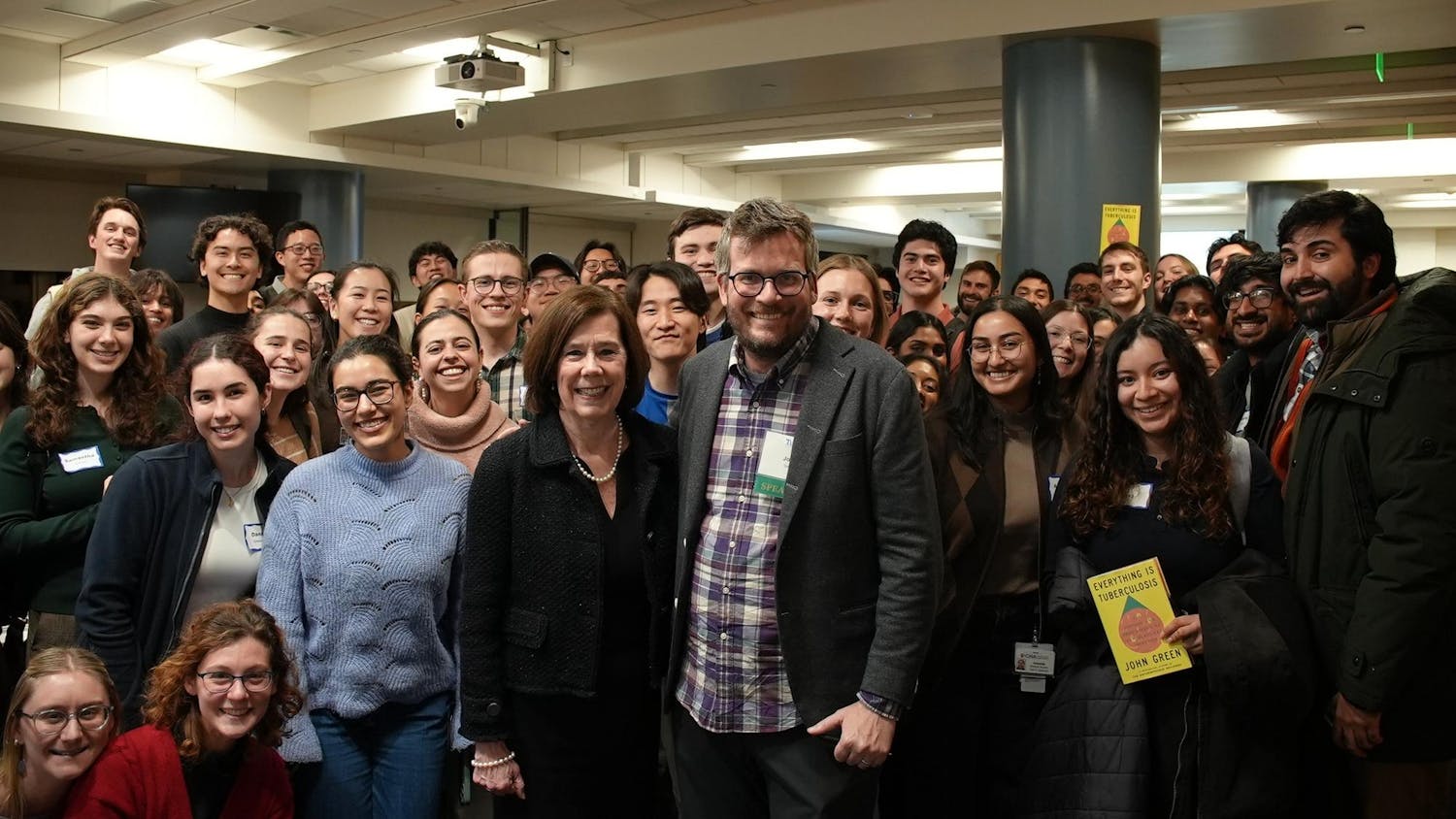Among fall 2015 incoming students, 11.2 percent identified as Jewish, according to a survey conducted by the Tufts University Chaplaincy. While Tufts Hillel offers one religious and cultural outlet for these Jewish students, the student group Alt-J (Alternative Jews) aims to provide a different option for Jewish students on campus.
Formed in winter 2014, Alt-J began when a number of students at Tufts sought to practice Judaism independently of Tufts Hillel, according to senior Hannah Freedman, one of the students who initially helped start the group.
“There were a lot of conversations about resources, what we would need to make it happen, thinking about spaces and financial resources, and we realized that we really don't need much,” Freedman said.
The members began to meet for Friday evening Shabbat dinners and the group hosted a Passover Seder in 2015, according to Freedman. Though the Seder was funded by the Tufts Chaplaincy, Freedman said the weekly Shabbat dinners are all done potluck-style, with attendees each contributing dishes as they are able.
Freedman explained that the initial members of Alt-J came together specifically in response to Hillel International’s Standards of Partnership and Tufts Hillel's Israel Policy, both of which provide regulations regarding what individuals and organizations Hillel International and Tufts Hillel may or may not "partner with, house or host."
“Hillel, both as a Tufts group and as a national organization, has an official policy platform that they can't work with or otherwise endorse or support any groups or people that are calling for the Boycott, Divestment and Sanctions from Israel,” Freedman said.
Freedman, who is a member of Tufts Students for Justice in Palestine (SJP), said she also opposes Hillel’s support of Birthright Israel, which sends Jews between the ages of 18 and 26 on a free 10-day trip to Israel.
“It makes me feel really sad and upset to see how Hillel pushes, supports and funds the Birthright movement,” she said. “As an American Jew, I have this 'birthright' of a free trip to Israel, when nobody in my family has ever lived in Israel, has any ties to Israel and some of my Palestinian friends whose parents and grandparents were born in Palestine and can never go back don't have that birthright.”
These differing positions on Israel, Palestine and Judaism, along with what Freedman sees as the more formal environment of Hillel, pushed her and several others to meet outside the framework of the Tufts branch of the international organization, she said.
But since the group's founding, the purpose of the group and its members' reasons for joining it have varied. According to junior Hannah Nahar, another member of Alt-J, not all members of the group joined due to disagreements with Hillel's policies.
Nahar said that some Alt-J members attend both Tufts Hillel and Alt-J events.
“It's meant to be an alternative, and not in opposition,” Nahar said. “There is definitely crossover [with] Hillel. I mean, we are intentionally not part of Hillel, so we do get a slightly different demographic, but ... we want to be communicating with people in Hillel.”
Because the political identities of Alt-J members vary from person to person, Nahar emphasized that she could only speak from her experience, not for the entire group. Freedman reiterated that all members of Alt-J bring their own perspectives and goals to the group.
“The relationship between Alt-J and Hillel depends a lot on the individual members," she explained. "[There are] some people that are committed to working at Hillel to be pushing more of the kinds of programming that we do want to see in Hillel, and then other people that are just totally focused on making Alt-J the space they want it to be."
Rabbi Jordan Braunig, the director of the Initiative for Innovative Community Building at Tufts Hillel, said he has been able to meet with and collaborate with some of the members of Alt-J.
"The emergence of Alt-J has always felt like an opportunity for me to be in conversation with, and sometimes serve as a resource to, a group of committed ... Jewish students on campus," Braunig told the Daily in an email. "I really don't see Alt-J as oppositional [to Hillel], but as an example of a homegrown space for people to connect their activism and their Judaism."
Alt-J promotes a theme of social justice through many of its events, according to Freedman. She said that at a Passover Seder held by Alt-J last year, the group discussed social justice issues along with practicing traditional Passover rituals – an approach to to the holiday that reflects the current Alt-J members' interests.
“I ... think that the social justice emphasis is ... a reflection of who's in the group right now, and the other passions that people have and the ways in which I, at least, feel like my Judaism directs my social action,” Freedman said.
SeniorJesse Mahler, an Alt-J member who attended last year's Passover Seder, said he feels that Alt-J reflects his personal commitment to social justice and openness.
“I would think of us positioned in a space [in which] Jews who are interested in social justice and passionate [about] wanting to create change, who are openly critical or at least willing to listen to criticisms of Israeli occupation, can come to understand the ways in which we can enact change and the ways in which we can understand how our identities – race, class, gender, sexuality – play into our political values,” Mahler said.
Nahar said Alt-J's social justice approach is imbedded in Jewish values, even though she feels some Jewish communities do not fully commit to discussing and addressing social justice issues.
“We use a social justice frame because Judaism has a really rich history of social justice, which we want to think about,” she said. “We want to really talk about it and think about what it means to be located as Jews right now on our campus.”
According to Nahar,Alt-J has continued to offer Shabbat gatherings, now almost every week, on Friday nights. These events are mostly organized through posts on Alt-J’s Facebook page, and the meals are normally held at either an off-campus house or an on-campus building or center such as the Arts Haus, Crafts House or Interfaith Center, according to Freedman.
While the group may have a casual feel, Nahar said she values making the group open and accessible to anyone interested in participating.
“It's informal, but we're also doing our best to make it as open as possible, so that it doesn't feel like just a bunch of Jewish friends, so that it doesn't become exclusionary in that way,” Nahar said. “So we have an open Facebook group, we post all of our information there, in terms of 'Shabbat's going to be here' in addition to having Facebook events for every Shabbat, so that people who aren't in the Alt-J Facebook group can see it. It's a priority to give it a non-institutional feel.”
As the group grows larger, the members have sought to find the balance between maintaining an intimate feel while ensuring an inclusive and open space, Mahler said, adding that the group's structure also allows it to serve as a way for Jews on campus to organize around different social justice causes.
“[W]e want it to be an inclusive group in that more and more people can come, because we want to create a space where people's experiences are heard and validated, but at the same time, it can become a really good vehicle to be like, 'Hey, this is going on this weekend, come turn out,'" he said. "Because it's a great means when you're talking about Jews who want to act for different forms of justice. It's an outlet to be able to do that."
As Alt-J grows, the future of the group will largely be determined organically by the members who comprise it, Nahar said.
“Alt-J is a very young group,” she said. “It's very organic, we don't have a lot of structure, which is the way we like it, although it's also a challenge. And we'll just have to see what we do next, I guess.”
More from The Tufts Daily
Serve & Survey: Emotionally editing humanity
By
Jaylin Guzman
| February 20





